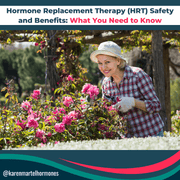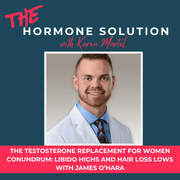Whether it is long and flowy or short and sassy, hair is very personal yet also incredibly public. A significant life event, a wedding, breakup, or a new baby may make us want to cut, color and curl it, let it grow long and make it silky straight, or rock it natural.
Hair is part of who we are. So, when hair starts to get sparse, thin, fall out or turn gray, it’s a pretty big deal. Hair loss is utterly distressing, completely frustrating and absolutely inevitable as we get older. To top it off, there is no quick fix and rebounding takes time.
Reasons for hair loss vary. To figure out what may be going on requires being a really patient super sleuth. One place to start investigating is hormones. Here is a list of different types of hormonal hair loss:
- Hormonal birth control
- estrogen deficiency
- testosterone
- PCOS
- insulin resistance
- progesterone deficiency
- thyroid disease
Hormonal Birth Control: Some progestins (a dangerous form of synthetic progesterone) shrink and damage the hair follicle and ironically, are sometimes prescribed to treat hair loss in hopes that synthetic estrogens will counteract the progestins and promote hair regrowth. It’s best to let your own natural estrogen and progesterone do their job without the assistance from the “phonies”. Removing birth control may cause a temporary increase in hair loss for a few months but once your own hormones are running the show, your hair should return slowly.
Estrogen Deficiency, PCOS and Insulin Resistance: Our hair spends more time in the growth phase when adequate amounts of estrogen are present in the body. As estrogen declines, as it does in menopause, the hair on our head suffers. How? In the absence of estrogens and accumulations of body fat, there is a significant decrease in sex hormone binding globulin (SHBG) concentrations and increase in free androgens.
In PCOS (polycystic ovarian syndrome) there is also insulin resistance and hyperandrogenism. Insulin resistance exacerbates androgen production. The imbalance between androgens and estrogen cause women to lose scalp hair and sometimes lead to the growth of hair in places where women hate – the face, chest and back.
Testosterone: Testosterone is an androgen (steroid hormone) that can intensify the effect that depleting estrogen has on hair loss. Testosterone’s metabolite dihydrotestosterone (DHT) can produce progressively weaker hair due to the follicle’s failure to thrive. Hair follicles begin to shrink (called miniaturizing) causing hair to stop growing normally, and fall out.
Progesterone and Stress: Progesterone protects the hair follicle from testosterone and is the reason why women’s hair grows abundantly during pregnancy. Stress causes progesterone deficiency because it forces the body to convert progesterone into the stress hormone cortisol. Hair loss caused by stress is called telogen effluvium. It is categorized by sudden thinning of your hair across your entire scalp so you will notice more hairs on your pillow, your hairbrush and in the drain trap. If you notice hair loss like this, go back about two to three months to determine the stressful event or life change that precipitated it.
Thyroid Disease: The hair growth process seems to be a very energy-consuming process. Skin cells contain receptors for thyroid hormones, which are produced in the HPT (hypothalamus pituitary) axis. These hormones regulate the energy of hair follicle metabolism and mitochondrial functions. Mitochondria are like battery packs that shuttle through the system giving us energy. When the thyroid becomes underactive, as in hypothyroidism for example, our metabolism slows down and lesser important bodily functions do not get as much attention because they are less critical to survival. Hair and skin usually suffer first. In an overactive thyroid, eyebrow, beard, underarm and pubic hair loss has been noted.
Ferritin: Is like a storage warehouse where iron is kept. When there are low iron stores, there is anemia. Hair follicles like ferritin and hang on to it. When the body is low in iron, it may pull ferritin stores from places like hair follicles, because as we mentioned earlier, it is not deemed as important as, let’s say, producing red blood cells. The resulting is hair loss.
Vitamins B and D: To keep hair follicles active, we need oxygen-rich blood cells to feed our hair follicles. Vitamin B12, nicknamed the “energy vitamin”, promotes healthy hair growth by aiding in the production of red blood cells. It is nicknamed so because a deficiency of this vitamin can be manifested as fatigue and weakness. Vitamin D’s moniker, “the Sunshine Vitamin”, helps create new hair follicles by initiating the growing phase. Low serum levels of Vitamin D levels have been found in women with female pattern hair loss. Additionally, people with alopecia areata, an autoimmune condition the leads to hair loss, have been noted to have low levels of Vitamin D.
Rapid Weight Loss: When there is a significant reduction of your intake of calories and micronutrients, it can stress your body and trigger temporary hair loss. Diet-related hair loss is most common in people who go to extremes to quickly lose weight. As mentioned earlier, stress causes progesterone deficiency resulting in hair loss. Thankfully, hair loss is not usually permanent. When adjustments are made in the diet, it is usually possible to regrow hair to a normal level.
Treating hair loss may require an extended, multi-pronged approach. As you can see, the factors contributing to hair loss can be numerous. Go back a few months to try and determine what happened and talk to your healthcare provider about it.
Changes in diet and lifestyle may need to be implemented in order to reverse hair loss and promote re-growth. Supplements like iron, zinc, Vitamins B and D may help. Minoxidil is a topical medication that works by stimulating blood flow to the hair and helping hair move into the growth phase of the hair cycle faster. Minoxidil does not stop hormonal hair loss but works by making existing hair follicles grow new hairs faster.
Reduce stress by taking frequent breaks to clear your mind, exercising regularly, and keeping a journal may help. Be patient with yourself, especially after the death of a loved one, job loss or financial reversal, all of which can impact stress levels.
Be in it for the long run. I know, it DOES take time for body to respond to efforts in correcting hair loss, perhaps even a year or more. Stick to the course, trust the process and be positive about the marvelous capacity your body has to heal.














